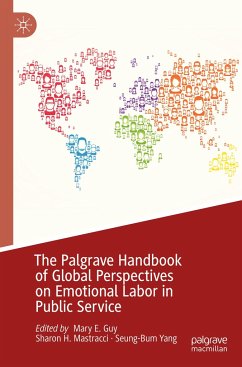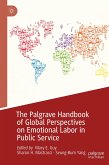The Palgrave Handbook of Global Perspectives on Emotional Labor in Public Service challenges traditional public administration theory and its disavowal of the emotive component to public service delivery. Providing a comprehensive and comparative overview of the current research in this previously understudied area, this handbook situates emotional labor within public service and establishes emotional labor within individual, organizational, cultural, and situational scenarios. With chapters spanning twelve different countries across six continents, this handbook provides groundbreaking survey research that probes the daily work experience of public servants, paying special attention to the relational aspect of public service delivery. It ultimately seeks to revise the current public service paradigm, and will be an invaluable resource to researchers, public managers, and international public service organizations as the first of its kind for the public administrationmarket.
Bitte wählen Sie Ihr Anliegen aus.
Rechnungen
Retourenschein anfordern
Bestellstatus
Storno








